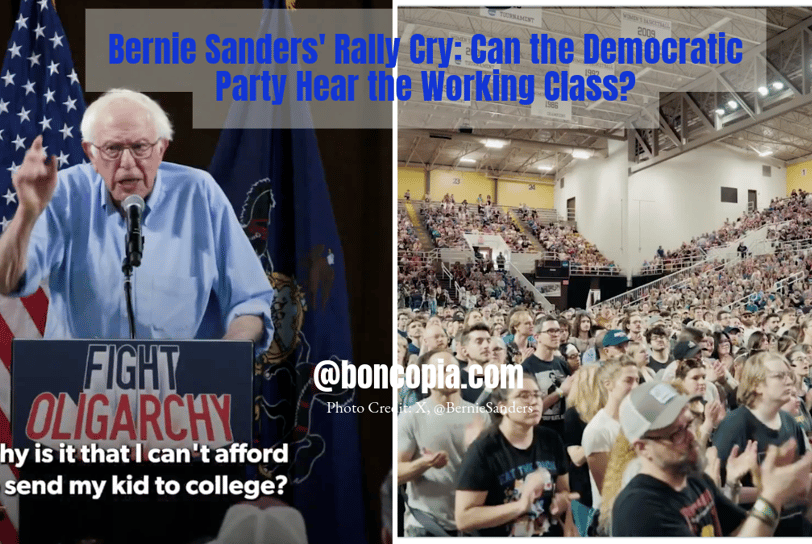Bernie Sanders' Rally Cry: Can the Democratic Party Hear the Working Class?
5/27/20253 min read


Bernie Sanders' Rally Cry: Can the Democratic Party Hear the Working Class?
Introduction
Bernie Sanders' recent X post has sparked a conversation that resonates deeply within the Democratic Party and beyond. With 75% of Democrats calling for a more progressive, pro-working class direction, Sanders questions whether the party leadership is listening. His video, captured at a rally in Bethlehem, PA, on May 3, 2025, is a stark reminder of the disconnect between the party's base and its leaders. As a platform for public voices, InsightOutVision.com explores this critical moment for the Democratic Party. Can it reclaim its soul, or is it too entrenched in the status quo?
The Message
Sanders' 68.90-second video is a powerful indictment of the Democratic Party's failure to prioritize working-class Americans. Speaking to a large crowd, he demands, "We need a Democratic Party which makes a fundamental choice, are you on the side of the working class in this country or not?" His words echo concerns about childhood poverty, stagnant wages, and unaffordable healthcare and housing. This message is not new for Sanders, but its timing—post-2024 election—adds urgency. The election results, with Trump's re-election and the dismissal of charges against him, have heightened fears of democratic backsliding, making Sanders' call to action more relevant than ever.
The Numbers Speak
The data supports Sanders' critique. The Federal Reserve's 2024 report shows the top 1% of Americans now hold 32.3% of the nation's wealth, while the bottom 50% own just 2.5%. A Pew Research Center survey from January 2025 reveals that 54% of respondents across 36 countries, including a majority in the U.S., see the wealth gap as a "very big problem." In the U.S., 76% of liberals agree, compared to 30% of conservatives. These figures underscore the economic inequality that Sanders has long fought against, and they highlight the Democratic Party's challenge in addressing it.
A Party Divided
The Democratic Party stands at a crossroads. Sanders' post suggests a growing divide between the party's leadership and its base. The Progressive Democrats of America, founded in 2004, continue to push for a citizen-controlled party, resisting what they see as corporate influence. This internal tension is not new. Sanders' political career, marked by independence and a focus on economic justice, has often clashed with the party's establishment. His 2016 and 2020 presidential campaigns highlighted these divisions, with Sanders arguing that the Democratic National Committee favored establishment candidates over grassroots movements.
The 2024 Wake-Up Call
The 2024 election results have forced a reckoning. Trump's re-election and the subsequent political landscape have prompted discussions on a "strategic shift" towards "patriotic populism," as noted by political analysts. This shift aims to re-engage working-class voters, a demographic Sanders has long championed. However, the question remains: will the party leadership embrace this change, or will it continue to prioritize corporate interests? Sanders' skepticism is palpable, and his post challenges Democrats to reflect on their identity and priorities.
Public Voices, Public Action
As a platform for community sharing, InsightOutVision.com amplifies public voices in this debate. The working class, often marginalized in political discourse, deserves to be heard. Sanders' rally cry is a reminder that politics should serve the people, not just the powerful. The Democratic Party's future depends on whether it can listen to these voices and act on their demands. This is not just a partisan issue but a societal one, affecting millions of Americans struggling with economic insecurity.
Conclusion
Bernie Sanders' recent X post is more than a critique; it's a call to action for the Democratic Party to reclaim its soul. The party's ability to address economic inequality and prioritize the working class will shape its future and the nation's. As public voices continue to demand change, the question is whether the party will respond. The stakes are high, and the time for action is now.
Thought Questions
How can the Democratic Party bridge the gap between its leadership and its progressive base?
What role should public voices play in shaping the party's platform and policies?
Is it possible for the Democratic Party to reclaim its working-class roots without alienating its corporate donors?
How might the 2024 election results influence the party's strategy moving forward?
What lessons can the Democratic Party learn from Bernie Sanders' approach to economic inequality and grassroots activism?
Explore deep insights on current events and growth.
Vision
Truth
hello@insightoutvision.com
+1-2236036419
© 2025. All rights reserved.
